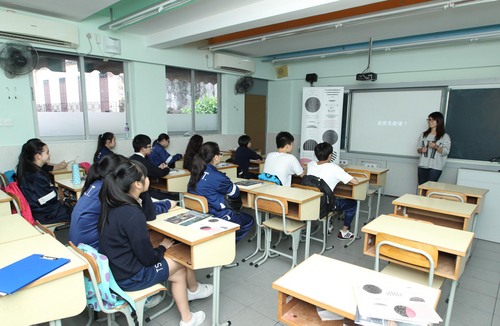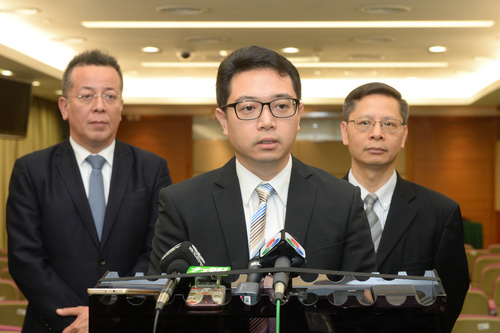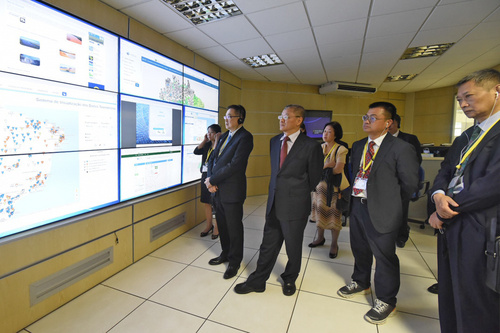Macao SAR Government Portal
News
UM launches ‘3+2’ and ‘4+X’ programmes to provide direct admission to world’s top graduate schools
The University of Macau (UM) has launched a ‘3+2’ programme and a ‘4+X’ programme. Students participating in the programmes will be directly admitted to some of the world’s top graduate schools upon completion of a certain number of years of studies at UM. Participants in the ‘3+2’ programme will receive a bachelor’s degree from UM and a master’s degree from a top overseas university upon completion of the programme. The ‘4+X’ programme reserves places at top overseas universities for qualified students.Recently, UM signed agreements on two programmes with the University of Toronto (UT) and Temple University (TU), respectively. According to the agreement with UT, UM students who meet the criteria for academic performance will be directly admitted to UT’s Faculty of Medicine upon completion of four years of undergraduate studies at UM. According to the other agreement, signed between UM with TU, qualified students will receive a bachelor’s degree from UM and a master’s degree from TU upon completion of three years of studies at UM and two years of studies at TU. In addition to these two universities, discussions are also underway to reach similar agreements with other world-renowned universities, including Peking University, Tsinghua University, Fudan University, the University of Lisbon, and George Washington University. UM expects to conclude collaboration agreements with these universities soon.UT is one of the best universities in the world. Its Faculty of Medicine is ranked among the top medical schools in the world, with the latest rankings placing it at No 12. Because of its high quality, the Doctor of Medicine Programme at UT is very popular with students from around the world and admissions to the programme are extremely competitive. Starting from 2018, UM students who have completed their undergraduate studies at UM will have the chance to become a medical doctor by enrolling in the Doctor of Medicine Programme at UT.According to a separate agreement with TU, starting in 2017, UM will send outstanding students selected from the Bachelor of Science in Computer Science Programme, Bachelor of Science in Electrical and Computer Engineering Programme, and Bachelor of Science in Economics Programme, to TU for two years of master’s studies. Successful candidates will be automatically granted the ‘first-semester scholarship’, which is renewable. The selection process within the three departments has been completed, and the first batch of students is expected to be sent to TU this summer. TU has been ranked by Princeton Review as one of the best colleges in 2017 and No 1 in Graduate Entrepreneurial Mentorship.For enquiries about the above programmes, please contact Ms Candy Wong from the Academic Affairs Office at 88224807 or samiwong@umac.mo.
…
Applications for the 28th Macao Arts Festival Outreach Programme open on 13 March
The tickets for the 28th Macao Arts Festival (MAF), organized by the Cultural Affairs Bureau, will be available from 12 March. This edition’s Outreach Programme features over 40 activities, including talks, master classes, workshops, meet-the-artists sessions, school performances, art critique, accessibility services and movie screenings. Applications will be accepted from 9am on 13 March (Monday).The MAF outreach activities will be launched in April. “One Day! Cantonese Opera”, to be held on 1 and 8 April, passes on the artistic essence of tradition, allowing participants to join hands with young actors and put into practice their Cantonese opera techniques and experience the world of Cantonese opera; famous Hong Kong expert in Japanese culture, Kengo, will hold the lecture “The Untold Secrets of Japan – Kengo’s Talk on Japanese Culture” on 8 April, helping participants understand the Japanese Yamato people and unveil crazy and bizarre secrets of Japan; the “Masterclass with the Bill T. Jones/Arnie Zane Company”, to be held on 29 April, helps participants to explore themselves, practice and reflect on how to use one’s own body to express social issues; dancers of intermediate and advanced levels must submit dancing-related curriculum when registering; the activity “Workshop on Art Critique for Secondary School Students”, to be held between April and May, will continue to improve young critics’ writing and arts appreciation skills. The experienced instructors will impart their unique drama and dance appreciation techniques to students, who will put theory into practice by writing art critiques after watching the programmes.The MAF Outreach Programme offers many other activities. Most activities have free admission. Vacancies are limited and subject to availability. For more information, please refer to the MAF Outreach Programme booklet or visit the Festival’s webpage at www.icm.gov.mo/fam. Reservations are available online through www.icm.gov.mo/eform/event, or by phone. For more information and reservations, please call IC through tel. 8399 6699, during office hours.
…
Applications for the 28th Macao Arts Festival Outreach Programme open on 13 March
The tickets for the 28th Macao Arts Festival (MAF), organized by the Cultural Affairs Bureau, will be available from 12 March. This edition’s Outreach Programme features over 40 activities, including talks, master classes, workshops, meet-the-artists sessions, school performances, art critique, accessibility services and movie screenings. Applications will be accepted from 9am on 13 March (Monday).
…
IC attaches great importance to the CCAC investigation report
The Cultural Affairs Bureau (IC) attaches great importance to the investigation report announced by the Commission Against Corruption (CCAC) regarding the recruitment of workers under the system of acquisition of labour service, and will immediately tackle the issue, including:
- Studying and analysing the investigation report circumspectly;
- Complying with CCAC’s suggestions and take measures in accordance with the laws stipulations to rectify the inappropriateness mentioned in the report as soon as possible;
- After clarification and in-depth investigation, promptly tackle the relevant problems about staff recruitment and other administrative matters involved;
- Sum up the lesson, listen humbly, review carefully and seek for any deficiencies;
In the process of this investigation, the Cultural Affairs Bureau has cooperated closely with the Commission Against Corruption and agrees with the needs for improvement mentioned in the report. The Cultural Affairs Bureau expresses heartfelt gratitude to CCAC for perceiving the inadequacies.
…
Specific price survey results on 3 kinds of products
Consumer Council conducted its specific price survey on diapers, over-the-counter drugs, and milk powderon 10 March for the implementation of Section 2b), Article 10, Law 4/95/M of 12 June. Result of the mentioned survey has been uploaded to the Council’s website (www.consumer.gov.mo) and is available in the Council’s ‘Supermarket Price Information Platform’ iPhone and Android apps, and on the Council’s WeChat account page.For inquiry, please call the Council’s hotline: 8988 9315.
…
Tickets for the 28th Macao Arts Festival on sale from Sunday
The 28thMacao Arts Festival (MAF), organized by the Cultural Affairs Bureau and themed “Heterotopia”, will be held from 28 April to 31 May, establishing through texts, stories, images, music and imagery, a diversified space away from reality yet closely connected to it, bringing new possibilities to existence. Tickets will be available through the Macau Ticketing Network from 10am on 12 March (Sunday). For the convenience of the public, queuing vouchers will be distributed from 9am on the same day. Telephone and online bookings are available from 12pm on 12 March.This edition of the MAF offers a variety of exceptional performances. The Festival kicks off with Play and Play: An Evening of Movement and Music, a reinterpretation of Schubert and Ravel’s classics by internationally acclaimed North-American modern dance company Bill T. Jones / Arnie Zane, and closes with The Seagull, performed by the Reykjavik City Theatre. On the occasion of the 110th anniversary of Chinese theatre, the Shaanxi People’s Art Theatre takes to the stage the classic Westland Feuds. Several local performances are also fascinating: the soundscape theatre play Back to the Catastrophic Typhoon of 1874, which original novel was awarded at the Macao Literature Competition; The Nether, which portrays the seemingly limitless dividing line between the real and virtual worlds; and numerous family programmes such as Rusty Nails & Other Heroes, Metamorphosis under Starry Night, A Mano, cater for people all ages to take part in the Festival.Various types of discounts are offered in this edition of the MAF. Tickets for the 28thMAF will be available at the Macau Ticketing Network from 10am on 12 March (Sunday). Reservations can be made by phone or online from 12pm onwards on the same day. On the first day of ticket sales, each person can purchase a maximum of ten tickets per performance, except for the performances Rusty Nails & Other Heroes, Metamorphosis under a Starry Night and A Mano, which are limited to four tickets per person. Early bird discounts of 30%, subject to certain criteria, are available from 12 to 19 March and a 20% discount will be offered from 20 March onwards. Members of the public who purchase their tickets with a BOC Credit Card or BOC card will receive a 30% discount on tickets for the opening and closing performances, Play and Play: An Evening of Movement and Music and The Seagull, as well as a 20% discount on all other shows. A 20% discount on tickets for all shows is also available for purchases with MasterCard, Visa Card or UnionPay Card from ICBC (Macau), BCM Bank, or OCBC Wing Hang Bank. A 50% discount will also be offered to holders of Macao Senior Citizen Card or Disability Assessment Registration Card, limited to one ticket per person. For each purchase over MOP800 (net price after discount), purchasers will receive one discount voucher to enjoy exclusive offers at MGM’s selected restaurants and spa (available while stocks last). Air Macau customers can enjoy a 20% discount on ticket purchases at the ticketing outlets by presenting the respective boarding pass (flight code NX) within 7 days upon their arrival in Macao. There is also a special ticket arrangement for the show Remote Macao.For more information about the programmes, ticket purchase and other discounts, please check the 28thMacao Arts Festival Booklet; the booklet PDF version can be downloaded at www.icm.gov.mo/fam, follow the MAF’s page on Facebook or subscribe to IC’s WeChat account. Ticketing hotline: 2855 5555. Online ticket reservation is available at www.macauticket.com.
…
Brazil’s water resource development a reference point for Macao’s waters
The Brazilian Government’s efforts in managing its water resources and its strategy for developing such resources, are reference points for Macao’s management of its 85-square-kilometres of waters.On Wednesday (8 March) a delegation – from the “9+2” provinces and special administrative regions (SARs) that make up the Pan-Pearl River Delta (PPRD) Region – was on a visit to Manaus, Brazil, in order to gain a better understanding regarding the management of the Amazon River area and environmental protection projects relating to the area.The tour was part of an eight-day trip to Brazil and Portugal – from 5 to 12 March – which has been organised by the Macao SAR Government. It is an additional step in the efforts to diversify trade and economic cooperation between mainland China, Portuguese-speaking countries and Macao. It also aims to enhance Macao’s strategic positioning as a commercial and trade cooperation service platform between China and Portuguese-speaking countries.On Wednesday in Manaus, the Chinese delegation was briefed on, respectively: the progress of improvement work for the Rio Negro, a tributary of the Amazon River; legislation for the protection of water resources; and the geological resources and forests in the area and how to harness those resources.The head of the delegation, the President of the Administrative Committee of the Macao Trade and Investment Promotion Institute, Mr Cheong Chou Weng, spoke highly of the efforts of the authorities in Manaus to maintain the pace of economic activity while also protecting the ecological resources of Brazil.The Chinese Government paid great attention to environmental protection and the development of green business sectors, while at the same time maintaining stable economic growth, he said.The delegation also visited the Manaus Free Trade Zone to gain a better understanding of its development and its tax policies. The Deputy Director of the Planning and Development Office of the Zone, Mr Marcelo Souza Pereira, said he hoped a greater number of environmental companies, particularly from the PPRD Region, could establish business in the zone, making use of its low- or zero-tax policies in order to drive the development of green industries.After the stop in Manaus, the delegation left for Portugal. While in that country, the delegation will meet representatives of environmental-sector companies from Portugal and China, in order to gain a better understanding of the latest sectorial developments.The Chinese delegation has more than 50 members, The group includes: representatives from the National Development and Reform Commission; members of an environmental science association based in Sichuan Province; representatives from the Office of the Secretary for Economy and Finance of Macao; representatives from the Guangdong Provincial Development and Reform Commission; and members of governmental environment departments, and other related public departments from the provinces and SARs of the PPRD Region.The PPRD Region comprises: the mainland provinces of Fujian; Jiangxi; Hunan; Guangdong; Guangxi; Hainan; Sichuan; Guizhou; Yunnan; along with the Hong Kong SAR; and the Macao SAR.
…
Electoral Affairs Commission calls for fair media coverage of election
The Electoral Affairs Commission for the Legislative Assembly Election has urged local media to ensure a fair and objective coverage of each campaign team in the upcoming election for the Legislative Assembly.The updated Legislative Assembly Election Law clearly specifies the definition of campaigning; the Electoral Affairs Commission expects media outlets – based on their own professionalism – to be able to make a distinction between a news report and election propaganda, said the Chairman of the Commission, Mr Tong Hio Fong.Mr Tong made the remarks on Wednesday (8 March) during a meeting with more than 30 representatives from local media outlets reporting, respectively, in Chinese-, Portuguese- and English-language.The revised Legislative Assembly Election Law states that election propaganda aims to draw public attention to a particular candidate or candidates; it also aims to encourage voters – in an explicit or implicit way – to vote or not vote for a particular candidate or candidates.Mr Tong recalled that – according to the law – no election propaganda is allowed between the date of publishing of the official list of accepted candidates and the official date for the start of the campaigning period.Mr Tong said that media organisations should consider formulating internal guidelines to serve as reference for staff covering the election.In addition, Mr Tong said media outlets should delete comments from their online social platforms and websites that contain unlawful messages related to the election process.The Commission respects the freedom of the press and the freedom of speech – both protected by the Basic Law and the Legislative Assembly Election Law. The exercise of those freedoms, however, should not contravene the Legislative Assembly Election Law, added Mr Tong.The Commission is to launch a telephone hotline and a dedicated email account for media enquiries relating to the 2017 Legislative Assembly Election.
…
PPRD delegation visits Brazil for further exchanges on green industries
A delegation from the “9+2” provinces and special administrative regions (SARs) that make up the Pan-Pearl River Delta (PPRD) Region, is visiting Brazil to exchange ideas on the development and application of green energy and on new resources.The Macao SAR and the other PPRD economies pay great attention to environmental protection and the development of green business sectors, while at the same time maintaining stable economic growth, said the head of the visiting delegation, the President of the Administrative Committee of the Macao Trade and Investment Promotion Institute, Mr Cheong Chou Weng.His remarks were made on Tuesday (7 March) in Brasilia, the Brazilian capital. The comments were made during a tour of the headquarters at the Operations and Management Center of the Amazonian Protection System.The delegation’s two-country tour – from 5 to 12 March – covers Brazil and Portugal. It was organised by the Macao SAR Government, and is an additional step in the ongoing effort to diversify trade and economic cooperation between mainland China, Portuguese-speaking countries and Macao.The PPRD Region comprises: the mainland provinces of Fujian; Jiangxi; Hunan; Guangdong; Guangxi; Hainan; Sichuan; Guizhou; Yunnan; along with the Hong Kong SAR; and the Macao SAR.During the visit to the Operations and Management Center of the Amazonian Protection System, Mr Cheong mentioned that the Brazilian Government had increased its use of the latest technological tools such as data analysis, in order to maintain the sustainability of the Amazon River area.The Director of the Management Center, Mr Rogério Guedes Soares, said the Brazilian government was keen to use the latest technology as a way to ensure effective management of the Amazon River and environmental protection projects relating to the area.While on the site visit, the delegation was briefed regarding the facilities and equipment used to manage water resources. PPRD delegation members also shared insights with their hosts concerning the processes and challenges faced when conducting improvement projects in the Pearl River Delta area.Following the tour, the delegation held a meeting on Tuesday afternoon with the head of the international affairs department of the Ministry of Environment, Mr Fernando Coimbra; and the head of environmental projects for the Ministry of the Planning, Budget and Management, Ms Tânia Delfino Ribeiro.The deputy head of the visiting delegation – the president of an environmental science association from Sichuan Province – Ms Jiang Xiaoting, said the visit helped the PPRD delegation members gain a better understanding of Brazil’s successful experience in environmental management.The visit also aimed to make better use of Macao’s close ties with Portuguese-speaking countries as a route to boosting further exchanges and cooperation between provinces and regions of the mainland and Portuguese-speaking countries, added Ms Jiang.On Wednesday morning the PPRD delegation paid a visit to the Chinese Embassy in Brazil.The delegation has now arrived in Manaus, in the north of Brazil, to gain a better understanding of environmental protection projects in the Amazon River area.The delegation’s first official stop on its eight-day, two-country tour had been a meeting on Monday (6 March) in Brasilia, with the President of the Executive Board of the Brazilian Trade and Investment Promotion Agency, Mr Roberto Jaguaribe.Monday’s schedule also included an exchange session to discuss issues relating to environmental protection and the development of green sector. Those present included representatives from the Chinese Embassy in Brazil. Also attending were officials from, respectively: Brazil’s Ministry of the Environment; the country’s Ministry of Planning, Budget and Management; the Brazilian Trade and Investment Promotion Agency; and the Operations and Management Center of the Amazonian Protection System; together with representatives from seven Brazilian environmental companies.
…
“Anschlag Berlin──Poster Design from Berlin” exhibition will open soon
The “Anschlag Berlin──Poster Design from Berlin” exhibition, organised by the Cultural Affairs Bureau, will open at the Tap Seac Gallery, featuring a total of 70 posters by 35 designers from several Berlin-based design studios. The opening ceremony of the exhibition will be held on 14 March (Tuesday) at 6:30pm, at the Tap Seac Gallery. To complement the exhibition, the Cultural Affairs Bureau will organize a seminar entitled “From Berlin to Macau: Designer’s stage ”, to which all are welcome.Berlin, with its rich historical background and cultural uniqueness, provides an open environment for designers, enhancing their creativity and allowing the coexistence of multiple ideas regarding design. The posters featured in this exhibition are works inspired by the Zeitgeist Movement and contemporary Berlin, created by exceptional contemporary designers from renowned Berlin-based design studios, including Cyan, LSD, HeSign, EPS51, Ruddigkeit, Ariane Spanier, Fons Hickmann m23, Surface, among others. The exhibition includes posters relating to art exhibitions, festivals, concerts, performances and social issues. By sharing works that blend art and design, the Cultural Affairs Bureau hopes to provide a source of inspiration and an exchange opportunity for Macao design professionals.In order to allow for a more in-depth understanding of this exhibition and Berlin’s graphic design world, the Cultural Affairs Bureau will also organize a seminar entitled “From Berlin to Macau: Designer’s stage”, which will be held on 15 March (Wednesday) from 6:30pm to 9:30pm, at the Tap Seac Gallery. The three curators of the exhibition - Professor Fons Hickmann, Dr. Jianping He and Sven Lindhorst-Emme - and designer Laucke Siebein will present the works on display and share their creative experiences as guest speakers. The seminar will be conducted in English, with simultaneous translation into Cantonese. Admission to the seminar is free and all are welcome to enrol through the Bureau’s Activities Registration System (www.icm.gov.mo/eform/event) before 13 March. Seats are limited and available on a first-come, first served basis.The “Anschlag Berlin──Poster Design from Berlin” exhibition will be held from 15 March to 14 May, at Tap Seac Gallery. Admission is free. The Gallery is located at No. 95, Avenida do Conselheiro Ferreira de Almeida, and is open daily from 10am to 9pm. For more information about the exhibition and the seminar, please contact IC through tel. no. 8988 4017 during office hours.
…









